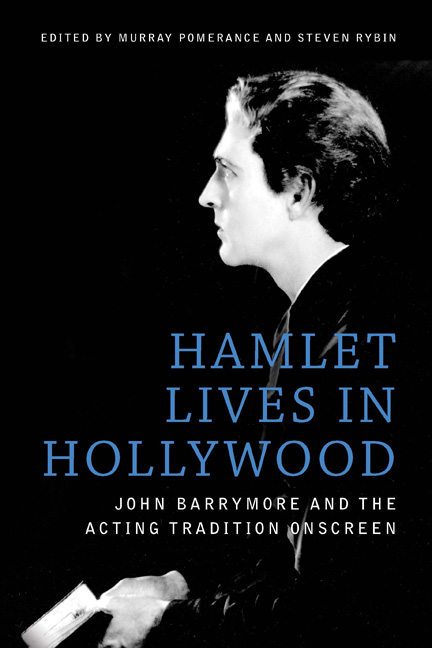Book contents
- Frontmatter
- Contents
- List of Figures
- The Contributors
- Acknowledgments
- Introduction
- 1 The Pre-Bard Stage Career of John Barrymore
- 2 Dangerously Modern: Shakespeare, Voice, and the “New Psychology” in John Barrymore's “Unstable” Characters
- 3 The Curious Case of Sherlock Holmes
- 4 John Barrymore's Introspective Performance in Beau Brummel
- 5 “Keep Back your Pity”: The Wounded Barrymore of The Sea Beast and Moby Dick
- 6 From Rome to Berlin: Barrymore as Romantic Lover
- 7 The Power of Stillness: John Barrymore's Performance in Svengali
- 8 Prospero Unbound: John Barrymore's Theatrical Transformations of Cinema Reality
- 9 A Star is Dead: Barrymore's Anti-Christian Metaperformance
- 10 Handling Time: The Passing of Tradition in A Bill of Divorcement
- 11 John Barrymore's Sparkling Topaze
- 12 “Planes, Motors, Schedules”: Night Flight and the Modernity of John Barrymore
- 13 Barrymore and the Scene of Acting: Gesture, Speech, and the Repression of Cinematic Performance
- 14 “I Never Thought I Should Sink So Low as to Become an Actor”: John Barrymore in Twentieth Century
- 15 Barrymore Does Barrymore: The Performing Self Triumphant in The Great Profile
- Works Cited
- Index
15 - Barrymore Does Barrymore: The Performing Self Triumphant in The Great Profile
Published online by Cambridge University Press: 23 June 2018
- Frontmatter
- Contents
- List of Figures
- The Contributors
- Acknowledgments
- Introduction
- 1 The Pre-Bard Stage Career of John Barrymore
- 2 Dangerously Modern: Shakespeare, Voice, and the “New Psychology” in John Barrymore's “Unstable” Characters
- 3 The Curious Case of Sherlock Holmes
- 4 John Barrymore's Introspective Performance in Beau Brummel
- 5 “Keep Back your Pity”: The Wounded Barrymore of The Sea Beast and Moby Dick
- 6 From Rome to Berlin: Barrymore as Romantic Lover
- 7 The Power of Stillness: John Barrymore's Performance in Svengali
- 8 Prospero Unbound: John Barrymore's Theatrical Transformations of Cinema Reality
- 9 A Star is Dead: Barrymore's Anti-Christian Metaperformance
- 10 Handling Time: The Passing of Tradition in A Bill of Divorcement
- 11 John Barrymore's Sparkling Topaze
- 12 “Planes, Motors, Schedules”: Night Flight and the Modernity of John Barrymore
- 13 Barrymore and the Scene of Acting: Gesture, Speech, and the Repression of Cinematic Performance
- 14 “I Never Thought I Should Sink So Low as to Become an Actor”: John Barrymore in Twentieth Century
- 15 Barrymore Does Barrymore: The Performing Self Triumphant in The Great Profile
- Works Cited
- Index
Summary
Produced by Twentieth Century-Fox, The Great Profile (1940) showcases the last significant screen performance of John Barrymore who, for comic effect, plays a thinly disguised John Barrymore bearing the very theatrical name of Evans Garrick. Yet the intriguing way in which he here constructs a version of his older and in-decline self has never drawn the critical attention it well deserves. This is both understandable and regrettable. The Great Profile takes for its title a sobriquet that Barrymore had enthusiastically adopted earlier in his career, marking it as autobiographical, which must have been a calculated marketing decision on the part of the studio. And the film refers more or less directly to recent events in his life as he slipped from stage and screen eminence into what some of his admirers regarded as alcoholic degradation and embarrassing incompetence in handling his personal affairs.
Yet Barrymore does more in this film than register on celluloid all of the warts of his currently failing self—career in jeopardy, latest marriage on the rocks, bankruptcy threatening because of huge sums of money owed to creditors, and his health on a downward spiral as a result of constant overindulgence in drink, leading to “benders,” memory blackouts, and the DTs. A one-dimensional autobiographical approach to The Great Profile of course reflects the most fundamental of category errors, confusing art and life, while failing to acknowledge that Barrymore here constructs a slanted fictional version of what he had become even while (as an actor with not just one but two bodies like any other) he remains legible as “himself,” that is, as a presence in full control of what he shows to moviegoers. Acting out marital discord is very different from enduring and participating in it, as Barrymore would have been able to point out. In other words, the film dramatizes, even as it exemplifies, Barrymore's performing self, imaged here triumphant over unpromising circumstances in a vehicle that was confected for him by a major studio. Evans Garrick offered a strong contrast to the less than worthy roles he had recently been offered by Hollywood in productions such as Hold That Co-ed (1938).
- Type
- Chapter
- Information
- Hamlet Lives in HollywoodJohn Barrymore and the Acting Tradition Onscreen, pp. 183 - 194Publisher: Edinburgh University PressPrint publication year: 2017



